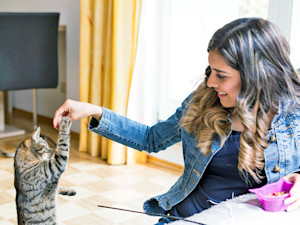Will My Kitten Bond With My Other Pets?
Here's how to help the new arrival settle in.

Share Article
In This Article:
How To Bond With a New Kitten Shy Kitten Socialization Tips How Long Does It Take To Bond With a Kitten? Why Is My Kitten Scared of Me? New Kitten Is Hiding From Other Pets
There's not much in this world more adorable than a kitten. Those big eyes, those tiny mews that aren’t quite meows yet, the downy fuzz on top of their sweet little heads — it's enough to melt even the hardest of hearts. But not everyone in your household is bound to be thrilled at the prospect of a new kitten coming into the fold. Your other pets may be immune to the cuteness, and may even seem downright unwelcoming.
When we brought our boys, Winston and Wilbur, home from our local animal shelter during the pandemic lockdown, our older cat, Freddy, let out a guttural moan unlike anything we’d ever heard come out of her before. We quickly ushered the kittens into a back bedroom, where we had a litter box, food, water, and plenty of soft blankets and toys ready and waiting. Freddy stood on the other side of the door with her tail puffed up, her entire body vibrating with displeasure. That's when we realized we had a rough road ahead of us.
If you've ever wondered how to bond with a new kitten — whether that’s with your older cat, your dog, your other family members, or you, their loving new parent, read on to find out what a cat behavior expert and a veterinarian have to say about it. (And rest assured, our three cats are fast friends now. It’s possible!)
Main takeaways
Patience is key when introducing a new kitten to your other pets.
Keep your new kitten separate from your other pets for a period of time, so that everyone has time to smell each other and get used to the idea of living together.
Socializing kittens when they’re young is important; it becomes harder as they get older.
Consult your veterinarian or a cat behavior expert if your new kitten hasn’t adjusted within a reasonable period of time.

How to bond with a new kitten
A kitten whose basic needs are being met is a kitten who is ready to bond with new people and other pets, so when bringing a new kitten home, think about what they need to feel safe and comfortable. “Kittens bond with their mothers because mom cat provides food, comfort, attention, play, and safety,” says cat behaviorist Stephen Quandt. “So, be the mom cat to your kittens, and provide all these things to them to help them bond with you.opens in new tab” That means you'll want to have the following things:
Food. Kittens love to eat! They}re tiny, but they’ve got a lot of growing to do. Consult your veterinarian about what food is best, and how much to give them, and be ready for the answer to be “a lot.” I still can't believe how fast our tiny boys could house a can of wet food. I should have entered them in an eating contest!
Soft blankets and bedding. It’s exhausting being a kitten. Be sure to give them plenty of comfy spots to cuddle up and take long cat naps. One thing to skip, though: swaddling blankets. Your new kitten may be your baby, but they aren't actually a baby. “I’m not in favor of ‘swaddling’ kittens, as this is called flooding and just causes them to shut down,” Quandt says.
Toys and attention. In addition to eating and sleeping, kittens love to playopens in new tab. Feather dancer toys are always a hit, and our boys were (and still are) big fans of toy mice. Have a few options on hand, and make sure you carve out plenty of time to play with them. Kittens don’t like to play alone — they want your attention! So give it to them, and they’ll love you for it.
Tips to socialize a shy kitten
Wondering how to bond with a new kitten, or how to get a shy kitten to come out of their shell? When you've got other pets at home, it can be a challenge to get them all on the same page and loving (or at least tolerating) each other. “For some happy-go-lucky, confident kittens, there can be the appearance of no adjustment being needed at all, and the new kitten runs around carefree and curious,” Quandt says. “Other kittens may be a little more meek or lower in confidence, and may need time to adjust both to the home, activities, noises and to the people." Read on for more tips from Quandt and veterinarian Dr. Stephen Turano.
Separate your kitten
Patience and time are key to bonding with a new kitten, Dr. Turano says. This means that when you first bring your kitten home, you'll want to wait a while before introducing them to the other pets at home. “It is best to keep pets separated before they meet. This will allow them to get the scent of one another without a direct confrontation,” he says. "Set up the kitten in a separate room in the house for the first few days. This will allow for separate feeding and controlled meetings.”
Watch your kitten’s body language
Once you begin introducing your kitten to the other pets in your home, “You will need to gauge the responses to determine how interactions are going” Dr. Turano says. “Cats are territorial, and it may take more than a few days for all to get along.”
Make the environment kitten-friendly
If your kitten is a little nervous or shy, Quandt recommends providing toys for gentle play “to bring out the confident hunter in them,” as well as “cozy igloo beds to hide in, climbing trees so they can express confidence through height, as well as tasty treats.” Along with a calm, quiet, and gentle approach, this will help bring your kitty out of their shell. (And when they get more confident, here’s how to teach them not to bite!)
Use food to win their heart
“Food is an important motivator,” Quandt says. “For very under-socialized kittens who resist any touching, using food is a great way to get to their heart.”
He suggests keeping a comfortable distance at first — this might mean feeding the kitten from a spoon, or even a long-handled bartender’s spoon — and reducing that distance bit by bit. “If they refuse to eat, then withhold the food and try again in an hour or two,” he says. “In a tough situation, you may have to withhold food a bit longer.” Eventually, your goal is to get the eating off your finger. “This means that with every lick, they are touching the thing they fear, while getting an immediate reward. From here you can progress to petting while eating.”
How long does it take to bond with a kitten?
There's no set answer to this question, Quandt says, as the time it takes kittens to adjust to their new home, and the other pets in it, varies greatly from one kitten to the next. However, in most cases, it won’t take too long. ”This could mean a day or two, or several days, or possibly even a little longer, but most kittens settle in fairly quickly.”
If your new kitten is under-socialized, or very young, be prepared for a longer adjustment period. In an under-socialized kitten, the developmental process has been temporarily stunted, Quandt explains. “Under-socialized kittens may need days, or in some cases even possibly weeks, to become fully socialized.” By providing a safe and loving environment for your shy cat, you’ll ensure that the process happens as quickly as possible. “Socialization is faster and more successful when the humans help the kitten adapt to people,” Quandt says.Why is my kitten scared of me?
If your new kitten seems scared of you, don’t take it personally. While some kittens may simply be a little nervous and lack confidence about their new home and family, some may actually be under-socialized. How to tell the difference? “If you observe a group of kittens together in a kennel at a shelter, and they’re all playing and rolling around, but the moment you approach they freeze, or become apprehensive, back away, or even begin hissing, then you know they’re probably under-socialized, because they were very confident until you got into the picture,” Quandt says.
If you adopt an under-socialized kitten, Quandt says it’s important to get them used to you right away, “lest the window of opportunity slips away from you, and they never become fully socialized. The older they are, the slower and more difficult socialization becomes,” he says. “Ideally, they are socialized from such an early age (three to four weeks) that they never display symptoms of being under-socialized. By five to eight weeks of age, with insufficient human contact, they will display under-socialized behaviors. After that, socialization gets harder, slower, and less predictable.”
What to do if your new kitten is hiding from other pets
If your new cat is hiding, even after an appropriate period of separation and gradual introduction to their new home, the first thing to do is make sure your kitten is safe. “If the kitten is afraid enough that they want to hideopens in new tab, they should be put in a small room like a bathroom with all the essentials (food, water, litter box, toys, a bed, a scratching post, etc.) so they don’t disappear in your home, complicating everything,” Quandt says.
When introducing your kitten to their new siblings, be prepared for your other pets to be more resistant than the new cat is. “Cat-to-cat introductions are by far the most common reason why people hire me,” Quandt says. “It can be a difficult and sometimes lengthy process to go through.” He stresses the need to keep the kitten from becoming afraid — possibly permanently — and says using barriers is one way to do this. “Cats are both predators and prey, and some cats may identify more as prey,” Quandt says. Needless to say, you don't want your new kitten to feel that they are in dangeropens in new tab, or being hunted by your other pets.
Introducing a kitten to a dog is essentially the same, according to Quandt. “Adopters should use proven techniques for cat-to-dog introductions, going slowly with positive reinforcement and barriers, leashes, and recall commands when effective.” While it's a myth that cats hate dogs, it's important to be cautious until you're absolutely certain your kitten is safe around your dog. “Never assume the kitten is safe in the dog’s presence until the dog has clearly proved this over some time,” Quandt says.
When to seek expert help
Have you tried everything, and your new kitten is still not getting along with your other pets? If your cat is afraid of youopens in new tab or the other animals in your household, if they are not eating, if they are hiding, or if they are displaying behavior that concerns you, it's time to call the experts.
Remember that your veterinarian is the best source of information and assistance when other tips and techniques have failed. “You can talk with your veterinarian at your kitten’s scheduled wellness exams about any concerns you have with introductions to other pets,” Dr. Turano says.
References
Progress Archive, Oregon State University. “Building the Bond between Cats and People.” https://archive.progress.oregonstate.edu/summer-2016/building-bond-between-cats-and-peopleopens in new tab Accessed 18 Dec. 2024.
Tabitha Kucera CCBC, RVT, KPA-CTP, Montgomery County, MD, Chirrups & Chatter. “Playing With Your Cat.” https://www.montgomerycountymd.gov/animalservices/Resources/Files/Playingwithyourcat-2020.pdfopens in new tab. Accessed 18 Dec. 2024.
Oklahoma City Animal Welfare. “Solving Aggression Between Family Cats.” https://www.okc.gov/home/showpublisheddocument/2096/635908685526700000opens in new tab. Accessed 18 Dec. 2024.
Oklahoma City Animal Welfare. “Reducing Your Cat’s Fearful Behavior.” https://www.okc.gov/home/showpublisheddocument/2088/635908684713870000opens in new tab. Accessed 18 Dec. 2024.
Mikkola, Salla, et al. “Fearfulness Associates with Problematic Behaviors and Poor Socialization in Cats.” Science, vol. 25, no. 10, 21 Oct. 2022, p. 105265. www.sciencedirect.com/science/article/pii/S2589004222015371opens in new tab. Accessed 18 Dec. 2024.

Elizabeth Laura Nelson
Elizabeth Laura Nelson is a writer and editor based in Brooklyn, New York, whose work has appeared in The New York Times, Jenny, Best Life, YourTango, Elite Daily, and more. She focuses her work on relationships, health and wellness, midlife, and lifestyle. As a child, Elizabeth was scared of cats (claws and teeth, yikes) but she has since gotten over her fear and now shares her home with three sweet and gentle feline companions who make life better (and cuddlier) every day.





